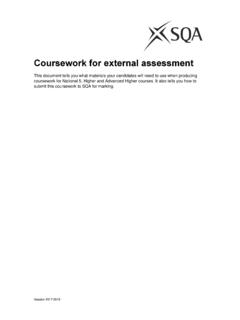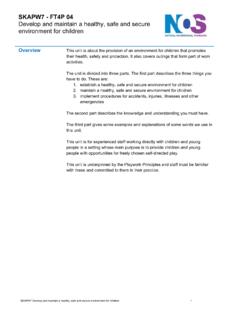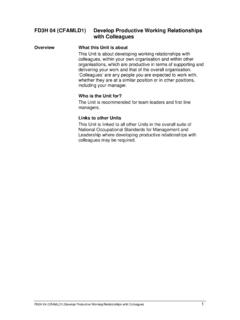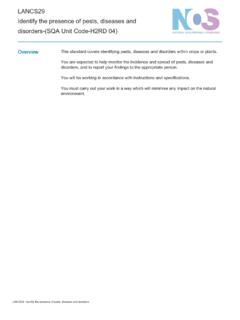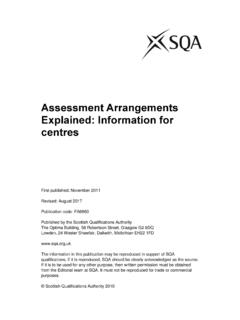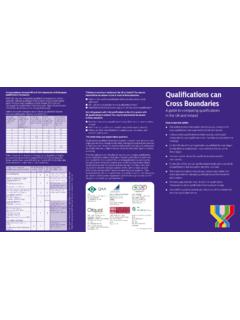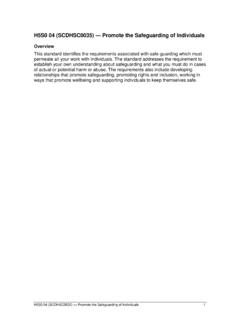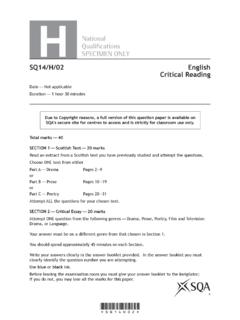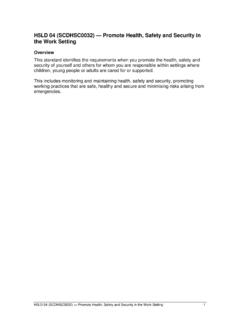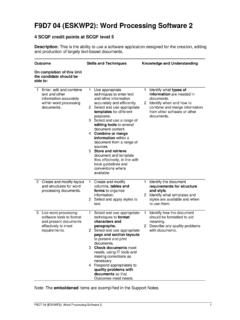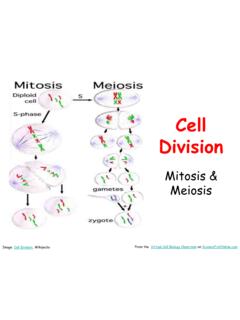Transcription of Higher Human Biology
1 Higher Human Biology Course code: C840 76 Course assessment code: X840 76 SCQF: level 6 (24 SCQF credit points) Valid from: session 2019 20 This document provides detailed information about the course and course assessment to ensure consistent and transparent assessment year on year. It describes the structure of the course and the course assessment in terms of the skills, knowledge and understanding that are assessed. This document is for teachers and lecturers and contains all the mandatory information you need to deliver the course. The information in this publication may be reproduced in support of SQA qualifications only on a non-commercial basis. If it is reproduced, SQA must be clearly acknowledged as the source. If it is to be reproduced for any other purpose, written permission must be obtained from This edition: November 2020 (version ) Scottish Qualifications Authority 2013, 2018, 2019, 2020 Contents Course overview 1 Course rationale 2 Purpose and aims 2 Who is this course for?
2 3 Course content 4 Skills, knowledge and understanding 5 Skills for learning, skills for life and skills for work 23 Course assessment 24 Course assessment structure: question papers 24 Course assessment structure: assignment 26 Grading 31 Equality and inclusion 32 Further information 33 Appendix 1: course support notes 34 Introduction 34 Developing skills, knowledge and understanding 34 Approaches to learning and teaching 34 Preparing for course assessment 88 Developing skills for learning, skills for life and skills for work 88 Appendix 2: question paper brief 91 Version 1 Course overview The course consists of 24 SCQF credit points which includes time for preparation for course assessment. The notional length of time for candidates to complete the course is 160 hours. The course assessment has three components.
3 Component Marks Scaled mark Duration Question paper 1: multiple choice 25 not applicable 40 minutes Question paper 2 95 not applicable 2 hours and 20 minutes Assignment 20 30 8 hours of which a maximum of 2 hours is allowed for the report stage Recommended entry Progression Entry to this course is at the discretion of the centre. Candidates should have achieved the National 5 Biology course or equivalent qualifications and/or experience prior to starting this course. Advanced Higher Biology other qualifications in Biology or related areas further study, employment and/or training Conditions of award The grade awarded is based on the total marks achieved across all course assessment components. Version 2 Course rationale National Courses reflect Curriculum for Excellence values, purposes and principles.
4 They offer flexibility, provide time for learning, focus on skills and applying learning, and provide scope for personalisation and choice. Every course provides opportunities for candidates to develop breadth, challenge and application. The focus and balance of assessment is tailored to each subject area. Biology , the study of living organisms, plays a crucial role in our everyday life, and is an increasingly important subject in the modern world. Biology affects everyone, and biologists work to find solutions to many of the world s problems. Advances in technology have made Human Biology more exciting and relevant than ever. The Higher Human Biology course gives candidates the opportunity to understand and investigate the living world in an engaging and enjoyable way. It develops candidates abilities to think analytically, creatively and independently, and to make reasoned evaluations.
5 The course provides opportunities for candidates to acquire and apply knowledge to evaluate biological issues, assess risk, make informed decisions and develop an ethical view of complex issues. Candidates are able to develop their communication, collaborative working and leadership skills, and are able to apply critical thinking in new and unfamiliar contexts to solve problems. The course uses an experimental and investigative approach to develop knowledge and understanding of concepts in Biology . Due to the interdisciplinary nature of the sciences, candidates may benefit from studying Human Biology along with other science subjects and mathematics, as this may enhance their skills, knowledge and understanding. Purpose and aims The course develops candidates interest and enthusiasm for Human Biology in a range of stimulating, relevant and enjoyable contexts.
6 It also allows flexibility and personalisation by offering a choice of contexts to study. The skills of scientific inquiry and investigation are developed throughout the course. This will enable candidates to become scientifically-literate citizens. The course provides a broad-based, integrated study of a range of biological topics which develop the concepts of Human Biology . The content is set in contexts that are of particular significance and relevance to the Human species. The course allows candidates to acquire a deeper understanding of cellular processes, physiological mechanisms and their impact on health, aspects of the nervous system, and defence mechanisms as they apply to the Human species. The development of skills enables candidates to adapt their learning to new situations, solve problems, make decisions based on evidence, and evaluate the impact of scientific developments on their health and wellbeing, society and the environment.
7 By setting the Version 3 acquisition of knowledge and skills in the context of Higher Human Biology , a stimulating, relevant and enjoyable curriculum prepares candidates for further education, training or employment, in areas associated with life sciences. The course aims to: develop and apply knowledge and understanding of Human Biology develop an understanding of Human Biology s role in scientific issues and relevant applications of Human Biology , including the impact these could make in society develop scientific inquiry and investigative skills develop scientific analytical thinking skills, including scientific evaluation, in a Human Biology context develop the skills to use technology, equipment and materials safely in practical scientific activities develop planning skills develop problem-solving skills in a Human Biology context use and understand scientific literacy to communicate ideas and issues and to make scientifically informed choices develop the knowledge and skills for more advanced learning in Human Biology develop skills of independent working Who is this course for?
8 The course is suitable for candidates who are secure in their attainment of National 5 Biology or an equivalent qualification. It may also be suitable for those wishing to study Biology for the first time. The course emphasises practical and experiential learning opportunities, with a strong skills-based approach to learning. It takes account of the needs of all candidates, and provides sufficient flexibility to enable candidates to achieve in different ways. Version 4 Course content The course content includes the following areas of Human Biology : Human cells The key areas covered are: division and differentiation in Human cells structure and replication of DNA gene expression mutations Human genomics metabolic pathways cellular respiration energy systems in muscle cells Physiology and health The key areas covered are.
9 Gamete production and fertilisation hormonal control of reproduction the Biology of controlling fertility antenatal and postnatal screening the structure and function of arteries, capillaries and veins the structure and function of the heart pathology of cardiovascular disease (CVD) blood glucose levels and obesity Neurobiology and immunology The key areas covered are: divisions of the nervous system and neural pathways the cerebral cortex memory the cells of the nervous system and neurotransmitters at synapses non-specific body defences specific cellular defences against pathogens immunisation clinical trials of vaccines and drugs Version 5 Skills, knowledge and understanding Skills, knowledge and understanding for the course The following provides a broad overview of the subject skills, knowledge and understanding developed in the course.
10 Demonstrating knowledge and understanding of Human Biology by making accurate statements, describing information, providing explanations and integrating knowledge applying Human Biology knowledge to new situations, analysing information and solving problems planning and designing experiments/practical investigations to test given hypotheses or to illustrate particular effects carrying out experiments/practical investigations safely, recording detailed observations and collecting data selecting information from a variety of sources presenting information appropriately in a variety of forms processing information (using calculations and units, where appropriate) making predictions and generalisations from evidence/information drawing valid conclusions and giving explanations supported by evidence/justification evaluating experiments/practical investigations and suggesting improvements communicating findings/information effectively Version 6 Skills, knowledge and understanding for the course assessment The following table provides details of skills, knowledge and understanding sampled in the course assessment.
